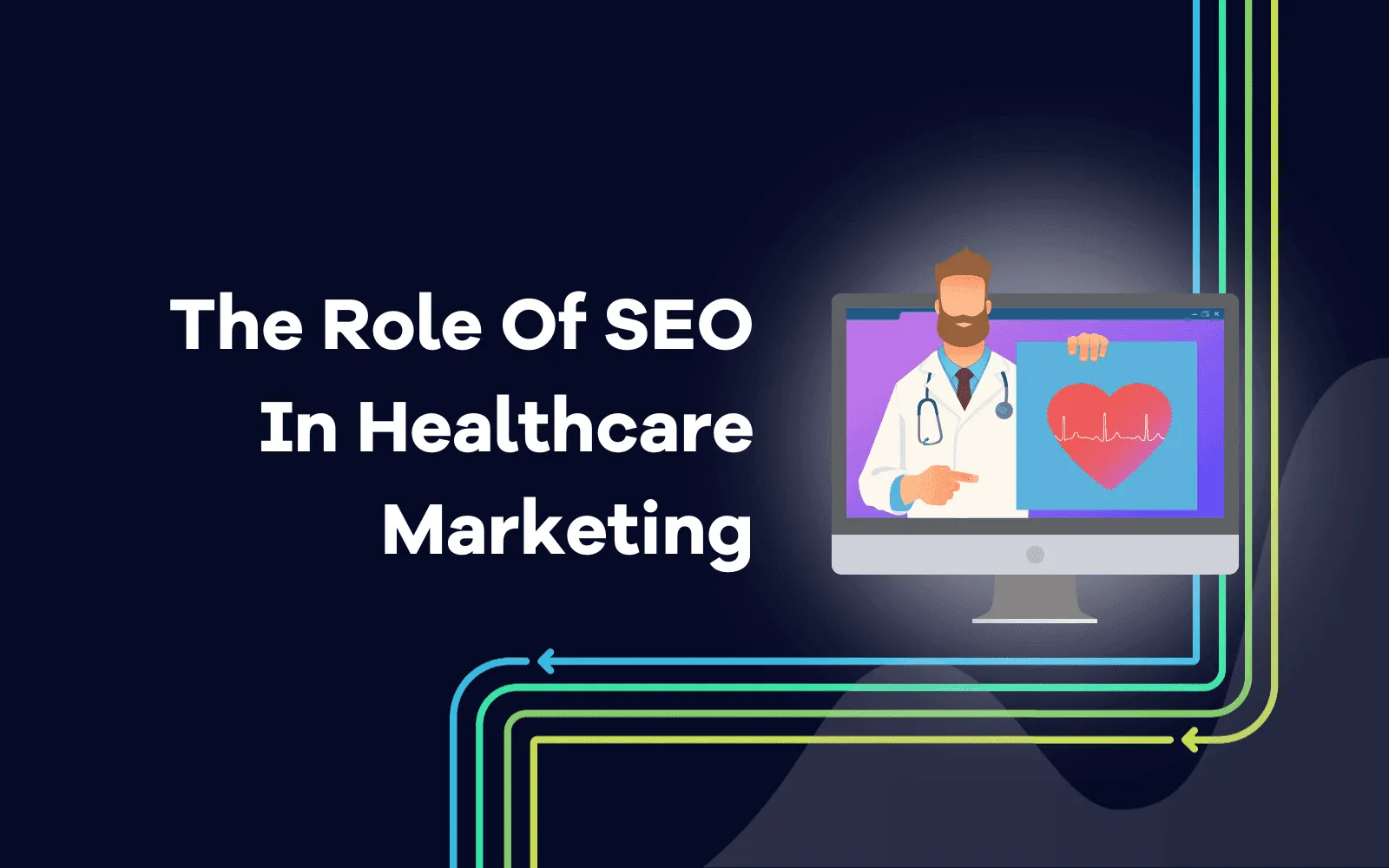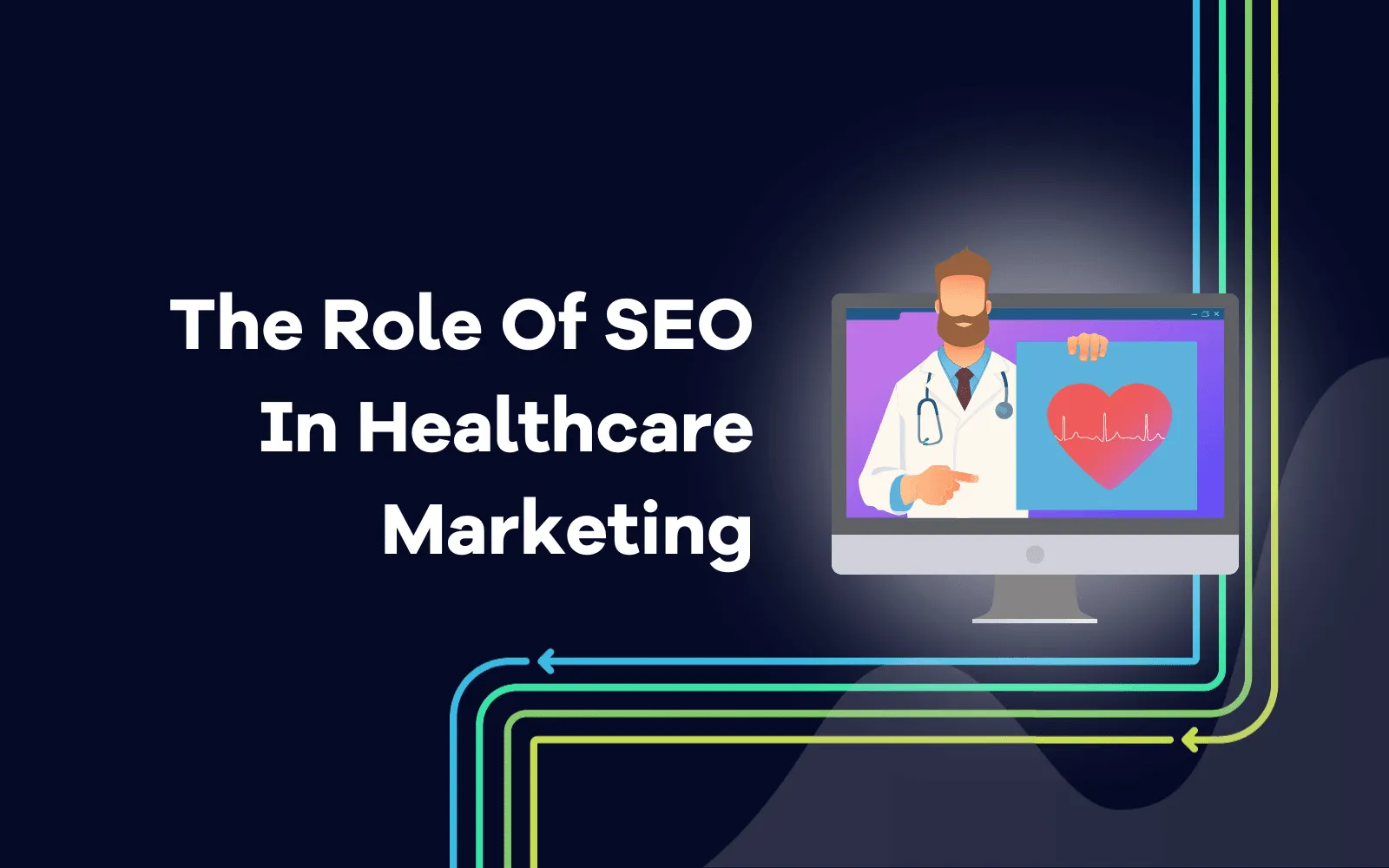
The Role Of SEO In Healthcare Marketing: Boosting Online Visibility And Patient Engagement

Wendy Dessler
September 11, 2023
Discover how SEO plays a crucial role in healthcare marketing, elevating your online visibility and engaging your target audience effectively.

Search Engine Optimization (SEO) is becoming increasingly significant for all industries, and healthcare is no exception. With an ever-growing dependence on the internet for health information, maintaining a strong online presence is crucial for healthcare providers. Utilizing SEO in healthcare marketing can enhance online visibility, improve patient engagement, and even foster trust and credibility.
This article will delve into the pivotal role of SEO in healthcare marketing and how it can be utilized to its fullest potential.
Creating A Strong Online Presence
The first crucial step in medical marketing is establishing a robust online presence. Doctors, dentists, and other healthcare providers must understand the importance of a well-designed, optimized website that offers value to potential patients. A key part of this is SEO – making your website visible to those using search engines. This is where digital marketing for doctors comes into play.
Incorporating SEO strategies such as keyword optimization, meta-tag descriptions, and high-quality backlinks ensures that your website ranks high in search engine results. Patients usually navigate through the first page of search results, rarely going beyond it. Thus, a higher ranking means better visibility and, consequently, an increase in patient appointments.
Boosting Patient Engagement
A well-executed SEO strategy goes beyond increasing visibility; it can significantly enhance patient engagement. To achieve this, healthcare providers need to create quality content that resonates with their target audience. This could include informative blogs, how-to videos, or interactive infographics that answer common health questions or explain complex medical terms in simple language.
By providing valuable, easy-to-understand content, healthcare providers can engage their audience, encourage them to spend more time on their website and increase their chances of returning. Moreover, engaging content often attracts shares and backlinks, further boosting SEO.
Enhancing Local SEO: Attracting Patients In Your Vicinity
Local SEO is a crucial facet of healthcare marketing. Most patients prefer healthcare providers close to home. By optimizing your website for local SEO, including specialized areas like orthopedic marketing and advertising, you can ensure that your practice shows up in local search results. This includes using location-specific keywords, creating a Google My Business page, and encouraging patient reviews.
Accurate, positive reviews can significantly enhance your online reputation, giving potential patients confidence in choosing your practice. By focusing on local SEO, healthcare providers can not only increase their visibility but also attract more patients from their locality.
 Source: https://cems-it.com/wp-content/uploads/2021/12/benefits-of-seo-products-services.png
Source: https://cems-it.com/wp-content/uploads/2021/12/benefits-of-seo-products-services.pngMobile Optimization: Catering To The On-The-Go Patient
More than half of web traffic now comes from mobile devices, and patients are increasingly using their smartphones to seek health information. Hence, mobile optimization is an essential part of healthcare SEO.
Mobile optimization involves designing your website so that it loads quickly and looks good on mobile devices, with easy-to-read text, clickable links, and a user-friendly layout. A mobile-optimized website not only ranks higher in search results but also provides a better user experience, leading to longer site visits and higher patient engagement.
Building Trust And Credibility
Healthcare is a field where trust and credibility matter immensely. Patients need to trust their healthcare providers and feel confident about the information they provide. SEO can play a significant role in building this trust.
By providing high-quality, accurate, and reliable content, healthcare providers can establish themselves as authoritative figures in their field. Moreover, a well-optimized, professional-looking website can enhance credibility, as it shows the provider's commitment to staying up-to-date and providing excellent patient service.
Embracing The Power Of Long-Tail Keywords
Long-tail keywords are extended phrases that internet users might type into a search engine when seeking specific information. Unlike short, common keywords, long-tail keywords are less competitive and more targeted, meaning they can boost your SEO while attracting the right audience.
Healthcare providers can benefit enormously from identifying and using long-tail keywords relevant to their services. For instance, rather than simply using 'dentist' as a keyword, a more specific term such as 'pediatric dentist in Queens' could attract a more relevant and local audience.
Leveraging Social Media
Social media platforms are powerful tools for boosting your SEO strategy. Regularly posting quality content on your social media platforms can drive traffic to your website, enhancing your SEO. Each post, like, and share increases your online visibility and engagement. This increased visibility not only helps in attracting potential patients but also improves your website's authority in the eyes of search engines.
To maximize the benefits, it's crucial to remember to integrate your SEO strategy into your social media activity. Incorporate your targeted keywords into your posts and hashtags, ensuring that they align with your healthcare services and what potential patients might be searching for. Additionally, always include links back to your website, further reinforcing your online presence. This integrated approach can greatly enhance your online visibility, making your healthcare services more accessible to potential patients and ultimately driving growth in your practice. So, make sure to leverage the synergies between social media and SEO to achieve your healthcare marketing goals.
The Role Of Online Directories And Citations
Listing your healthcare practice in online directories can substantially improve your SEO. Google considers these listings, or citations, as a key factor when ranking businesses in local search results. Make sure your business is listed in trusted online healthcare directories, and that your information is consistent across all platforms.
Also, encourage satisfied patients to leave reviews on these directories. Not only will positive reviews enhance your online reputation, but they also signal to Google that your practice is legitimate and appreciated, thereby improving your SEO.
Optimizing For Voice Search
With the rapid proliferation of smart speakers and digital assistants, the significance of voice search in healthcare SEO has grown substantially. An increasing number of individuals are now turning to voice search for health-related queries, emphasizing the need for healthcare providers to adapt their SEO strategies accordingly.
Voice search optimization necessitates a shift towards more natural language, the inclusion of longer and conversational keywords, and a focus on addressing frequently asked questions (FAQs) in your content. By doing so, you align your content with the way people speak and inquire when seeking health advice through voice commands. Furthermore, ensuring that your website is mobile-friendly and quick to load is imperative, as these factors can significantly impact your rankings in voice search results. In this era of voice-driven search, optimizing your healthcare content for voice queries is an essential step toward enhancing your online visibility and reaching a broader audience of potential patients.
As reported by Backlinkio, voice search results exhibited significantly swifter loading times when compared to the majority of web pages. To be precise, our data indicates that the average Time to First Byte (TTFB) for voice search results was .54 seconds, in stark contrast to the global average of 2.1 seconds for webpages.
 Source: Backlinko
Source: BacklinkoImplementing Structured Data For Enhanced Search Results
An often overlooked but incredibly beneficial aspect of SEO is the use of structured data, also known as schema markup. This is a form of HTML coding that helps search engines better understand the content on your website. By implementing structured data, healthcare providers can enhance the way their website is represented in search engine results pages (SERPs).
Structured data can enable "rich snippets" or "featured snippets" in the search results, which are enhanced descriptions or previews of the content on your page. For example, if you have a FAQ page about a specific medical procedure, structured data can help that information appear directly in the SERPs. This gives users quick answers to their questions and makes your website stand out in the search results, leading to higher click-through rates and improved SEO.
Leveraging structured data in your healthcare SEO strategy can provide a significant advantage in a competitive digital marketplace. Not only does it improve your website's visibility and usability, but it also positions your practice as a reliable and easily accessible resource for health-related information.
Understanding SEO Analytics And Adapting Your Strategy
Lastly, don't underestimate the importance of ongoing monitoring and adaptation when it comes to your SEO strategy. Utilize tools like Google Analytics to gain invaluable insights into various aspects of your website's performance, including traffic patterns, the effectiveness of specific content, and user behavior.
Comprehending these analytics empowers you to make informed decisions for refining your SEO strategy. For example, if specific keywords are consistently driving more traffic, you can strategically prioritize related content creation. Conversely, if you observe high bounce rates or quick exits from your site, it may signal the need for improvements in website design or loading speed, ensuring a more user-friendly experience that keeps visitors engaged and converts them into potential patients. Continuous evaluation and adjustment are key to achieving long-term success with your healthcare SEO efforts.
In Summary
SEO plays a significant role in healthcare marketing. From creating a strong online presence to enhancing patient engagement, from boosting local visibility to mobile optimization, and establishing trust and credibility, SEO has multiple benefits that can drive growth and success for healthcare providers.
However, healthcare SEO is not a one-size-fits-all strategy. It requires understanding your audience, continually updating and optimizing your website, and providing valuable, engaging content. While it might seem challenging, the results are worth the effort. By embracing SEO, healthcare providers can ensure they are not just seen online but chosen by patients in need. So, don’t lag in the digital race. Start implementing SEO in your healthcare marketing strategy and see the difference it can make in boosting your online visibility and patient engagement.
Related blog posts

How to Choose the Right AI Visibility Tool
Learn how to choose the right LLM tracking tool to monitor AI visibility. We go through key features, integrations, capabilities, and budget.
27 January 2026
5 LLM Visibility Metrics You Should Track in 2026
SEO is now both about ranking in search engines and being visible in LLMs. We give you five visibility metrics every SEO should track in 2026.
3 December 2025Is LLM Tracking Relevant for You?
LLM tracking is not just for SEOs. It is also relevant for content teams, agencies, marketing leadership, and communication teams. Learn why here.
26 November 2025
